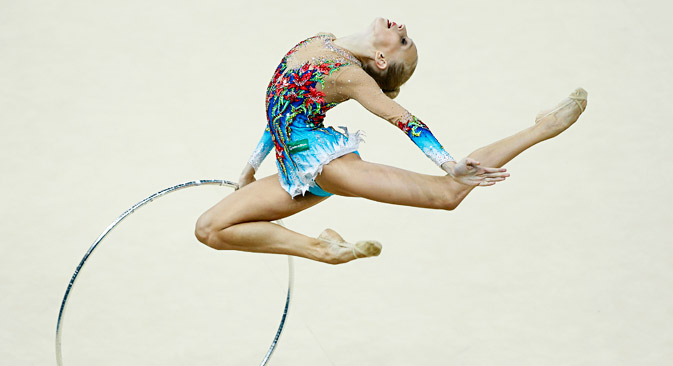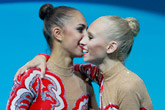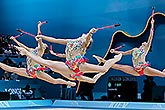Young rhythmic gymnast makes history in Kiev

Yana Kudryavtseva performs with the hoop during the individual all-around competition final at the 32nd Rhythmic Gymnastics World Championships in Kiev August 30, 2013. Source: Reuters
Looking at the results of the 2013 Rhythmic Gymnastics World Championships, which were held in the capital of Ukraine, one thing has not changed in this sport—the Russian team cannot be stopped. Eight sets of awards were given out at the championships. The Russian gymnasts, always favored to win, took six gold, two silver and two bronze medals. Second in the unofficial team medal count were the hosts of the tournament, the Ukrainians (1-2-2); the Belarusians came in third (1-1-3).
Still, a sort of revolution took place on the Kiev mats. Take, for example, fourth and fifth place in the individual all-around, which were won by gymnasts from China and Korea: The two countries have never before risen so high in this sport’s struggle for dominance.
Yet these wonderful discoveries at the championships were marred by intrigues and scandals. In Kiev, the incident whereby 50 international-class judges were suspended from judging (including more than 10 Russians) continued to develop unpleasantly, although quite expectedly. In the middle of the summer, all of these professionals were accused by the International Gymnastics Federation of cheating on their qualifying tests.
A new group of judges with unconfirmed qualifications—and with very few Russians—assessed the skills of the gymnasts in the first important competition of the 2013 season. For example, among the 12 Category-I judges, there was only one Russian. Meanwhile, Ukraine, Greece and Germany were all represented by two judges. In addition, none of the four individual events at the Kiev championships were judged by Russians.
Due to this, Russian experts and former champions have been saying that Ukrainian Anna Rizatdinova, the hoop event champion, received a gift victory for her performance at home. The entire Ukrainian delegation, however, has the absolute opposite opinion.
Source: Youtube
This situation could have been predicted. The team leader, two-time Olympic champion Yevgenia Kanaeva, did not compete, having married hockey player Igor Musatov and currently expecting a baby. She was replaced by athletes that are talented, but still inexperienced. This opened many opportunities for competitors.
In all her pre-competition comments, the head coach of the Russia team, Irina Viner, repeated that the Russian rhythmic gymnasts had to be not just one step ahead of the competition, but two or three, so that no one could doubt their superiority.
In the end, the Ukrainian and Russian competitors were just hundredths of a point apart in the hoop event. In spite of the fact that Margarita Mamun won the ball exercise and Yana Kudryavtseva came in second, the two Russian girls did not go to the mixed zone to talk. The Russians are not accustomed to losing.
When Ukrainian Rizatdinova was awarded her medal, they played the Russian anthem. It was another setback for the championship’s organizing committee that happened to play into the Russians' hands—unlike, for example, cutting off the music during Kudryavtseva’s qualifying round and the lack of time for testing the mat in the group event.
If 15-year-old Yana held up under pressure and won the all-around championship (which 19-year-old Mamun was not able to do, although she came to Kiev as the Russian team leader, but lost all of her apparatus in the all-around and came in sixth in the Olympic-style program), indicating her ambitions for gold medals at future World Championships, the prospects for the Russian team in group events raises many questions.
The Russian team—which consisted of three Olympic champions—won the event with three balls and two ribbons, received the bronze in the all-around and came in fifth place in the event with 10 clubs. The instability of athletes in the previous Olympic round, which was so worrisome for the fans of Russian rhythmic gymnastics, has again surfaced. Head coach Irina Viner was forced to admit that it was not a case of judicial bias and not due to the intrigues in the eternal rivalry between the Ukrainian and Russian schools.
"I think that it is always very useful to lose," said Viner after the bronze in the group all-around. "Of course, it is too bad that this happened at the World Championships; but this is the first World Championships after the Olympic Games, so this will be a good lesson for us. There are three Olympic champions on the team who, unfortunately, think that they can do anything anytime they want. But, as soon as you come off the pedestal, you must start all over."
Regarding Kudryavtseva, who broke Alina Kabaeva's record and became the youngest all-around world champion, commentators are confident that her success was no fluke.
"Yana did a great job—she is a heroine. She was prepared and performed well," said Vera Shtelbaums in an interview with ITAR-TASS. Shtelbaums coaches Irina Chashchina and Yevgenia Kanaeva.
“They are saying that Kudryavtseva is headed for the same career as Kanaeva and Kabaeva? I think anything is possible, why not? She is a girl with good coordination and a good physique,” said Shtelbaums. “We will hope that she can preserve all of these qualities and develop them; then she may become an excellent gymnast by the 2016 Olympics. She will be 18 years old then—the most suitable age. But, to do this, she will need to train very seriously, just as she did before. We hope that she will be able stay on the crest of the winning wave."
All rights reserved by Rossiyskaya Gazeta.
Subscribe
to our newsletter!
Get the week's best stories straight to your inbox

